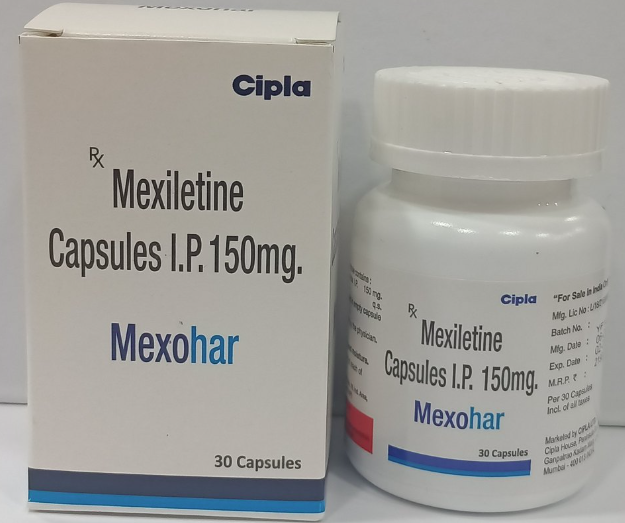Mexiletin capsules 150mg 30capsules

MEXILETINE
About
MEXILETINE is used to treat life-threatening arrhythmias (irregular heartbeats) such as ventricular arrhythmia. Arrhythmia is a condition in which your heart beats irregularly, too fast, or too slow.
MEXILETINE contains Mexiletine, which works by reducing the sensitivity of heart muscle cells to electrical impulses. Thus, it slows down electrical conduction in the heart muscle. Therefore, it helps restore regular heart rhythm.
Take MEXILETINE as prescribed. You are advised to take MEXILETINE for as long as your doctor has recommended it based on your medical condition. In some cases, MEXILETINE may cause common side effects such as stomach pain, insomnia (difficulty sleeping), dyspepsia (indigestion), dizziness, tremors (involuntary shaking), chest discomfort or headache. Most of these side effects of MEXILETINE do not require medical attention and gradually resolve over time. However, if the side effects persist, please consult your doctor.
If you are allergic to Mexiletine, local anaesthetics, or other medicines, please tell your doctor. If you are pregnant or breastfeeding, it is advised to inform your doctor before taking MEXILETINE. MEXILETINE is not recommended for children and adolescents below 18 years of age. Avoid alcohol consumption with MEXILETINE as it may worsen dizziness or drowsiness. MEXILETINE may cause dizziness, drowsiness or blurred vision in some people. Therefore, drive only if you are alert after taking MEXILETINE.
Uses of MEXILETINE
Ventricular arrhythmia (irregular heartbeats)
Medicinal Benefits
MEXILETINE contains Mexiletine, which is used to treat life-threatening arrhythmias (irregular heartbeats) such as ventricular arrhythmia. It decreases the sensitivity of heart muscle cells to electrical impulses. Thus, it slows down electrical conduction in the heart muscle. Thereby, it helps restore regular heart rhythm.
Directions for Use
Storage
Side Effects of MEXILETINE
-
Stomach pain
-
Insomnia (difficulty sleeping)
-
Dyspepsia (indigestion)
-
Dizziness
-
Tremor (involuntary shaking)
-
Chest discomfort
-
Headache
In-Depth Precautions and Warning
Drug Warnings
If you are allergic to Mexiletine, any local anaesthetics or any other medicines, please tell your doctor. If you are pregnant or breastfeeding, it is advised to inform your doctor before taking MEXILETINE. MEXILETINE is not recommended for children and adolescents below 18 years of age. Avoid intake of alcohol with MEXILETINE as it may worsen dizziness or drowsiness. MEXILETINE may cause dizziness, drowsiness or blurred vision in some people. Therefore, drive only if you are alert after taking MEXILETINE. Inform your doctor if you have a genetic problem with an enzyme in your body called CYP2D6 which breaks down (metabolizes) certain medicines in your body too slowly, because a different dose may be applicable to you. If you start to smoke or quit smoking while taking MEXILETINE, inform your doctor as smoking impacts the Mexiletine blood levels, and your dose may need to be adjusted accordingly.
Drug Interactions
Drug-Drug Interaction: Inform your doctor if you are taking medicines used to treat heart problems (amiodarone, verapamil, propranolol), anticonvulsants (phenytoin), antidepressants (fluvoxamine), a medicine used to treat stomach ulcer and gastric acid reflux (omeprazole), opioid analgesics (morphine), antacids, anticholinergic agent (atropine), anti-asthma drug (theophylline), a medicine used to prevent and treat nausea and vomiting (metoclopramide), caffeine-containing medications, antibiotics (ciprofloxacin, rifampicin), antidiabetic drug (metformin), blood thinner medicines (warfarin), or muscle relaxant (tizanidine).
Drug-Food Interaction: You are recommended to reduce caffeine intake by half while taking MEXILETINE as it can increase caffeine levels in the blood. Also, limit or avoid alcohol intake while taking MEXILETINE as it may worsen dizziness and drowsiness.
Drug-Disease Interaction: Avoid taking MEXILETINE if you have sinus syndrome (a type of heart rhythm disorder), long QT syndrome (an inherited heart condition), or heart problems which can cause ankle swelling or shortness of breath or some types of heart rhythm disorders. If you have low or high electrolyte blood levels, abnormal blood counts, seizures (fits), kidney, liver, or heart problems, please inform your doctor before taking MEXILETINE.
Drug-Drug Interactions Checker List:
- AMIODARONE
- VERAPAMIL
- PROPRANOLOL
- PHENYTOIN
- FLUVOXAMINE
- OMEPRAZOLE
- MORPHINE
- ATROPINE
- THEOPHYLLINE
- METOCLOPRAMIDE
- CIPROFLOXACIN
- RIFAMPICIN
- METFORMIN
- WARFARIN
- TIZANIDINE
Safety Advice
-
ALCOHOL
UNSAFEYou are recommended to avoid consumption of alcohol while taking MEXILETINE as it may worsen dizziness or drowsiness.
-
PREGNANCY
CONSULT YOUR DOCTORLimited data are available on the effect of MEXILETINE in pregnancy. Hence, if you are pregnant or planning pregnancy, inform your doctor before taking MEXILETINE. Your doctor may prescribe this medicine if the benefits outweigh the risks.
-
BREAST FEEDING
CAUTIONIf you are breastfeeding, please inform your doctor before taking MEXILETINE. Mexiletine may be excreted in breast milk. Therefore, if your doctor prescribes MEXILETINE, you will be advised to choose an alternate method of feeding your baby.
-
DRIVING
CAUTIONMEXILETINE may cause dizziness, drowsiness or blurred vision in some people. Therefore, avoid driving if you experience such side effects after taking MEXILETINE.
-
LIVER
CAUTIONMEXILETINE should be used with caution in patients with mild to moderate liver dysfunction and is not recommended for patients with severe liver disease. Therefore, inform your doctor if you have any liver problems before taking MEXILETINE.
-
KIDNEY
CAUTIONMEXILETINE is not recommended for patients with severe kidney disease. Therefore, inform your doctor if you have any kidney disease before taking MEXILETINE.
-

CHILDREN
UNSAFEMEXILETINE is not recommended for children and adolescents below 18 years of age.
Habit Forming
Diet & Lifestyle Advise
-
Maintain a low-salt diet and minimize eating processed foods as they contain more sodium. Try to replace salt with spices or herbs to add flavour to the food.
-
Do regular exercise as it helps lower blood pressure and keeps blood vessels and the heart in good condition.
-
Quit smoking as smoking increases blood pressure and heart rate.
-
Eat a balanced and healthy diet that includes plenty of vegetables, fruits, and low-fat or fat-free products.
Patients Concern
Disease/Condition Glossary
Arrhythmia (irregular heartbeat): It is a condition in which your heart beats irregularly, too fast, or too slow. Symptoms of irregular heartbeat include chest pain, shortness of breath, and fast or slow heartbeat. 60 to 100 beats per minute is generally considered a normal heart rate.
Ventricular arrhythmia: It is a type of arrhythmia which begins in the ventricles (lower chambers of the heart). It causes irregular heartbeat and prevents circulation of oxygen-rich blood to the brain and body, and may result in cardiac arrest. This condition may be life-threatening and requires immediate medical attention.




